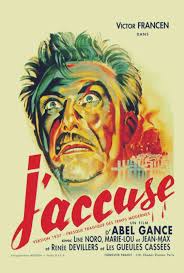
“Shit! Aren’t you tired of playing tennis with my carcass?”
Jean Diaz (Victor Francen) and Francois Laurin (Marcel Delaitre) are friends fighting in Verdun, France during WWI. Francois finds out that Jean is in love with his wife, Edith (Line Noro) and that they had been lovers in the past. Since the two of them are in the middle of fighting a war and have a common enemy, they decide to put aside their differences. Jean promises to never love Edith. Jean and Francois go out on patrol with ten other men. Only Jean and Francois return alive but are both wounded. Francois eventually succumbs to his wounds. Jean survives but war has affected his sanity.
In the meantime, Edith is back at home taking care of her daughter, Helene. Jean returns home suffering from shell shock. He does his best to take care of Edith and Helene. Helene (Renee Devillers) grows into a beautiful woman. Jean owns a glassworks factory and is an inventor. He develops a product he calls “steel glass”. The substance is impenetrable by bullets. Jean brings on an old war buddy, Henri Chimay (Jean-Max) to run the glassworks. Both Jean and Henri fall in love with Helene, but his mental injuries prevent him from committing to anyone. Henri marries Helene. Jean goes further into himself. Henri finds Jean’s plans for steel glass and develops the product. The government decides that they can use the product to fight in the next war.
Eventually, Jean recovers and realizes that those that died in the last war died in vain. A new war has been declared. Jean goes back to Verdun where all his comrades had been buried and, in a passionate plea, calls for those dead from the war to rise and remind the living what war is really about.
“J'accuse” was released in 1938 and was directed by Abel Gance. It is a French war drama with horror and science fiction elements. The movie is a remake of the 1919 silent film of the same name, which was also directed by Gance. The film was released just prior to the start of WWII.
Both this film and the 1919 silent were centrally about war. However, the 1919 version focused mostly on the romance between the two main characters, Jean and Edith and the triangle with Francois. The 1938 remake focuses on just the war aspect. The 1919 version enjoyed a wonderful restoration whereas the 1938 version is sadly in need of some TLC.
There’s a lot of war stock footage used in the film as well as a lot of melodrama. The plot threads can be a little difficult to follow due to all the symbolism that Gance interjects in the film. The ending, however, is a very powerful image and goes on for at least the last eleven minutes of the film. The special effects are remarkable considering the age of the film.
Real war veterans with facial scars were used for the zombie soldier scenes. These men were referred to as gueules cassées or broken faces. Gance’s stance on war is front and center. He hated war but knew that mankind would never stop creating it. The beginning of the film contains a dedication from Gance illustrating this. His statement is translated as “This film is dedicated to the war dead of tomorrow, who will no doubt watch it without recognizing in it the face of their own times.”
The actor that played Flo, Sylvie Gance, was married to director Abel Gance.

